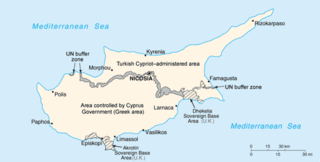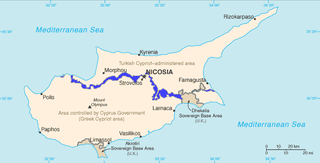United Nations Security Council Resolution 364, adopted on December 13, 1974, noted reports from the Secretary-General and Government of Cyprus about the prevailing conditions on the island, as well as General Assembly resolution 3212 and previous resolutions.

United Nations Security Council Resolution 383, adopted on December 13, 1975, noted a report from the Secretary-General that in the existing circumstances the presence of the United Nations Peace-Keeping Force in Cyprus was still needed not only to maintain the cease-fire but also to facilitate the "continued search for a peaceful settlement". The Resolution noted the report of the prevailing conditions on the island and the concurrence of the parties concerned with the Secretary-General's recommendation of extending the stationing of the Force in Cyprus for another 6 months.

United Nations Security Council Resolution 401, adopted on December 14, 1976, noted a report of the Secretary-General that, due to the existing circumstances, the presence of the United Nations Peacekeeping Force in Cyprus would continue to be essential for a peaceful settlement. The Council expressed its concerns regarding actions which could heighten tensions, and asked the Secretary-General to report back again before April 30, 1977 to follow the implementation of the resolution.

United Nations Security Council Resolution 410, adopted on June 15, 1977, noted a report of the Secretary-General that, due to the existing circumstances, the presence of the United Nations Peacekeeping Force in Cyprus would continue to be essential for a peaceful settlement. The Council expressed its concerns regarding actions which could heighten tensions, and asked the Secretary-General to report back again before November 30, 1977 to follow the implementation of the resolution.

United Nations Security Council Resolution 422, adopted on December 15, 1977, noted a report of the Secretary-General that, due to the existing circumstances, the presence of the United Nations Peacekeeping Force in Cyprus would continue to be essential for a peaceful settlement. The Council expressed its concerns regarding actions which could heighten tensions, and asked the Secretary-General to report back again before May 31, 1978 to follow the implementation of the resolution.

United Nations Security Council Resolution 430, adopted on June 16, 1978, noted a report of the Secretary-General that, due to the existing circumstances, the presence of the United Nations Peacekeeping Force in Cyprus would continue to be essential for a peaceful settlement. The Council expressed its concerns regarding actions which could heighten tensions, and asked the Secretary-General to report back again before November 30, 1978 to follow the implementation of the resolution.

United Nations Security Council Resolution 443, adopted on December 14, 1978, noted a report of the Secretary-General that, due to the existing circumstances, the presence of the United Nations Peacekeeping Force in Cyprus would continue to be essential for a peaceful settlement. The Council expressed its concerns regarding actions which could heighten tensions, and asked the Secretary-General to report back again before May 31, 1979 to follow the implementation of the resolution.

United Nations Security Council Resolution 451, adopted on 15 June 1979, noted a report of the Secretary-General that, due to the existing circumstances, the presence of the United Nations Peacekeeping Force in Cyprus (UNFICYP) would continue to be essential for a peaceful settlement.

United Nations Security Council Resolution 458, adopted on 14 December 1979, noted a report of the Secretary-General that, due to the existing circumstances, the presence of the United Nations Peacekeeping Force in Cyprus (UNFICYP) would continue to be essential for a peaceful settlement. The council expressed its concerns regarding actions which could heighten tensions, and asked the Secretary-General to report back again before 31 May 1980 to follow the implementation of the resolution.

United Nations Security Council Resolution 472, adopted on 13 June 1980, noted a report of the secretary-general that, due to the existing circumstances, the presence of the United Nations Peacekeeping Force in Cyprus (UNFICYP) would continue to be essential for a peaceful settlement. The council expressed its concerns regarding actions which could heighten tensions, and asked the Secretary-General to report back again before 30 November 1980 to follow the implementation of the resolution.

United Nations Security Council Resolution 482, adopted on 11 December 1980, noted a report of the Secretary-General that, due to the existing circumstances, the presence of the United Nations Peacekeeping Force in Cyprus (UNFICYP) would continue to be essential for a peaceful settlement. The council expressed its desire for all parties to support the ten-point agreement for the resumption of intercommunal talks, and asked the Secretary-General to report back again before 31 May 1981 to follow the implementation of the resolution.

United Nations Security Council Resolution 486, adopted on 4 June 1981, noted a report of the Secretary-General that, due to the existing circumstances, the presence of the United Nations Peacekeeping Force in Cyprus (UNFICYP) would continue to be essential for a peaceful settlement. The council expressed its desire for all parties to support the ten-point agreement for the resumption of intercommunal talks, and asked the Secretary-General to report back again before 30 November 1981 to follow the implementation of the resolution.

United Nations Security Council resolution 604, adopted unanimously on 14 December 1987, noted a report of the secretary-general that, due to the existing circumstances, the presence of the United Nations Peacekeeping Force in Cyprus (UNFICYP) would continue to be essential for a peaceful settlement. The Council expressed its desire for all parties to support the ten-point agreement for the resumption of intercommunal talks, and asked the secretary-general to report back again before 31 May 1988, to follow the implementation of the resolution.

United Nations Security Council Resolution 646, adopted unanimously on December 14, 1989, noted a report of the Secretary-General that, due to the existing circumstances, the presence of the United Nations Peacekeeping Force in Cyprus (UNFICYP) would continue to be essential for a peaceful settlement. The Council expressed its desire for all parties to support the ten-point agreement for the resumption of intercommunal talks, and asked the Secretary-General to report back again before May 31, 1990, to follow the implementation of the resolution.

United Nations Security Council resolution 697, adopted unanimously on 14 June 1991, noted a report of the Secretary-General that, due to the existing circumstances, the presence of the United Nations Peacekeeping Force in Cyprus (UNFICYP) would continue to be essential for a peaceful settlement. The Council asked the Secretary-General to report back again before 30 November 1991, to follow the implementation of the resolution.

United Nations Security Council resolution 698, adopted unanimously on 14 June 1991, after recalling Resolution 682 (1990) dealing with financial issues and all resolutions on Cyprus up to the most recent Resolution 697 (1991), the Council expressed its concern regarding the financial situation facing the United Nations Peacekeeping Force in Cyprus (UNFICYP), established in Resolution 186 (1964).

United Nations Security Council resolution 723, adopted unanimously on 12 December 1991, noted a report of the Secretary-General that, due to the existing circumstances, the presence of the United Nations Peacekeeping Force in Cyprus (UNFICYP) would continue to be essential for a peaceful settlement. The Council asked the Secretary-General to report back again before 31 May 1992, to follow the implementation of the resolution.

United Nations Security Council resolution 759, adopted unanimously on 12 June 1992, noted a report of the Secretary-General that, due to the existing circumstances, the presence of the United Nations Peacekeeping Force in Cyprus (UNFICYP) would continue to be essential for a peaceful settlement. The Council asked the Secretary-General to report back again before 30 November 1992, to follow the implementation of the resolution.

United Nations Security Council resolution 796, adopted unanimously on 14 December 1992, noted a report of the Secretary-General that, due to the existing circumstances, the presence of the United Nations Peacekeeping Force in Cyprus (UNFICYP) would continue to be essential for a peaceful settlement. The Council asked the Secretary-General to report back again before 31 May 1993, to follow the implementation of the resolution.

United Nations Security Council Resolution 1930, adopted on June 15, 2010, after reaffirming all resolutions on the situation in Cyprus, particularly Resolution 1251 (1999), the Council extended the mandate of the United Nations Peacekeeping Force in Cyprus (UNFICYP) for a further six months until December 15, 2010 while negotiations towards a settlement of the dispute on the island were underway.







